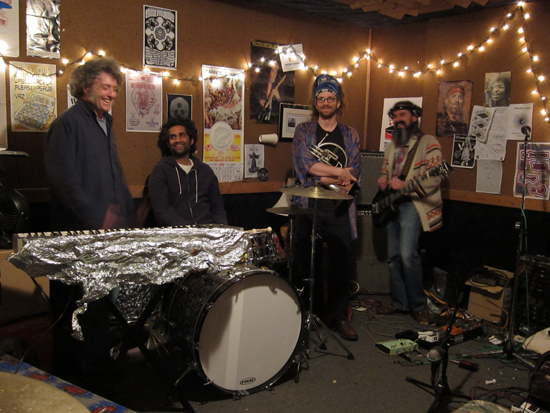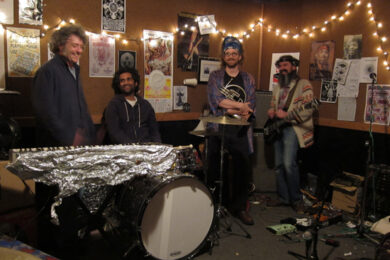As the lights flash and blink with an ever-increasing intensity to coalesce with the relentless hypno-monotony of the music they’re accompanying, the senses begin to yield to uncoordinated helplessness. The drones are swirling into an infinite vortex that only serves to disorientate the giddy surroundings framing what’s going on. As Wooden Shjips take full flight into as-yet-undiscovered dimensions of time and space, guitarist Ripley Johnson, his face framed by flowing locks of greying hair and an extended beard and with a pair of Wayfarers perched on his nose, begins to coax unholy howls from his instrument. As the noise reaches its zenith, his right hand moves to his sunglasses. As he removes them, his nose and eyes go with them and where once was a face is now a gateway to the never-ending reaches of the cosmos.
Actually, The Quietus’ meeting with Ripley Johnson isn’t anything like that. Well, certainly not the bit about his visage but the music produced by San Franciscan psychedelic overlords Wooden Shjips does possess the ability to transport whoever stands in its way to the outer reaches of the known universe. And indeed, beyond.
The band’s new album, West, is easily their most accomplished yet. Having left behind a trail of limited edition 7” singles, compilations and albums, the quartet’s ongoing quest to fry the mind via the ears has reached new heights thanks to a surrendering of power to engineer Phil Manley and time spent in a studio more sophisticated than what they’re normally used to. The result is a fuller, richer sound and one that’s likely to pick up new converts while satisfying the band’s long-standing disciples.
Ripley Johnson and The Quietus are sharing a pot of tea in a West End café. Dressed in jeans and a denim shirt, Johnson belies his psychedelic image. Focussed and determined and as the sole full-time musician in Wooden Shjips, Johnson divides his time between his main band and side-project, Moon Duo. Constantly on the musical move, Johnson’s prodigious output ensures that his mind-expanding journey shows no signs of abating any time soon.
You’re really spoiling us this year, aren’t you? We’ve had Moon Duo’s Mazes and now Wooden Shjips’ West is about to drop.
Ripley Johnson: Yeah! I started doing music full time about a year ago. The thing with the Moon Duo stuff is that the Shjips guys are doing other things working jobs and that kind of stuff. I can still do music. Before, it was a matter of getting everybody into a room to make a record and that takes time. The Shjips aren’t really that prolific.
So is it logistics that dictates what becomes Moon Duo and Wooden Shjips material?
RJ: Yeah. Any of the Moon Duo stuff could have been Wooden Shjips material if the others had been available. I mean, I don’t sit around writing songs all the time with a big notebook full of songs. I more project based or like an art project or something. I think about what the record is going to sound like or what studio we’re going to go into. Being a record geek I appreciate them in their whole. The record should be a statement of some kind or a view or capturing a moment in a band’s life and everything ties into that: the artwork, the lyrics, the songs, the way that it’s recorded. You know, if you appreciate artists like Neil Young or The Stones or bands that have been around for a long time, you know that their albums will tell a little story. I find that fascinating and that’s the way I approach things.
In our modern day scenario of off-the-peg culture, instant downloads and playlists, do find that you’re approach to making music is swimming against the tide?
RJ: Not really because I think there are still people out there that appreciate albums. I’m not sure that people have changed; it’s the technology. You’ll still hear great stuff on the radio and that’s great but then you have the whole Led Zeppelin approach where if you wanted to hear ‘Stairway To Heaven’ over again then you’d have to buy the album because they didn’t put out singles. I try to ignore history because in time, things are judged differently and you can’t try to play to a moment. That’s what pop bands do; they try to go for what’s hot now and they’ll try to make a sound that people like now but the best pop artists are always one step ahead. And if they’re lucky then people will like it when it’s and if they’re unlucky then people will like it in ten years.
It can be argued that there’s a benefit to both.
RJ: Sure but it’s a balancing act that very few people can pull off. David Bowie did and he’s on the cutting edge and he’s got people following him. That’s very rare. But you do wonder how music would have turned out if Lou Reed had been popular with The Velvet Underground in the 60s or if Iggy Pop had been popular in the 70s.
style="clear:both; height:3px;">
font-size:12px; font-family:Helvetica, Arial, sans-serif; margin:0; padding:
3px 4px; color:#999;"><a
href="http://www.mixcloud.com/TheStoolPigeon/wooden-shjips-stool-pigeon-mix/
utm_source=widget&utm_medium=web&utm_campaign=base_links&utm_te
rm=resource_link" target="_blank" style="color:#02a0c7;
font-weight:bold;">Wooden Shjips Stool Pigeon Mix by <a
href="http://www.mixcloud.com/TheStoolPigeon/#utm_source=widget&utm_medi
um=web&utm_campaign=base_links&utm_term=profile_link"
target="_blank" style="color:#02a0c7; font-weight:bold;">The Stool
Pigeon on <a
href="http://www.mixcloud.com/#utm_source=widget&utm_medium=web&utm_campaign
=base_links&utm_term=homepage_link" target="_blank" style="color:#02a0c7;
font-weight:bold;"> Mixcloud
<div style="clear:both;height:3px;">



